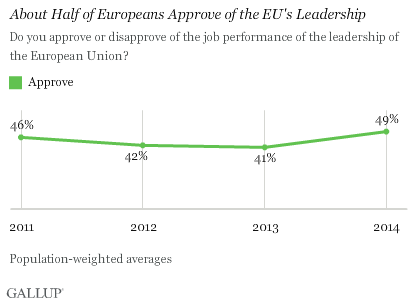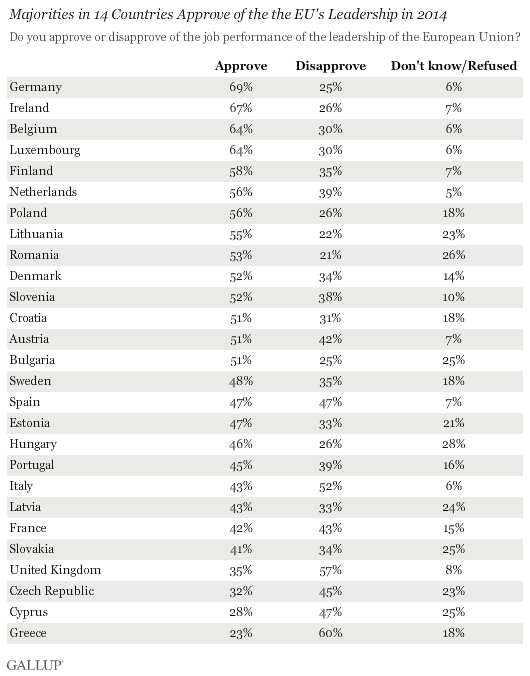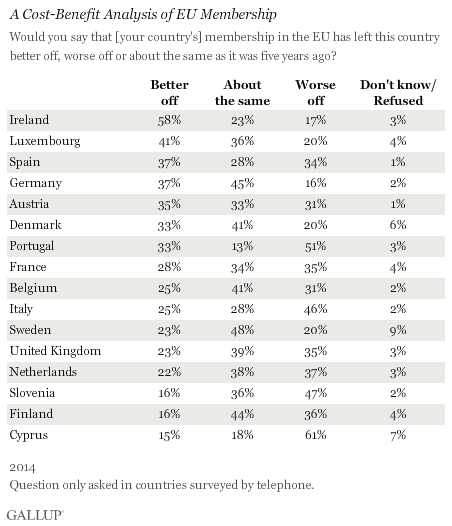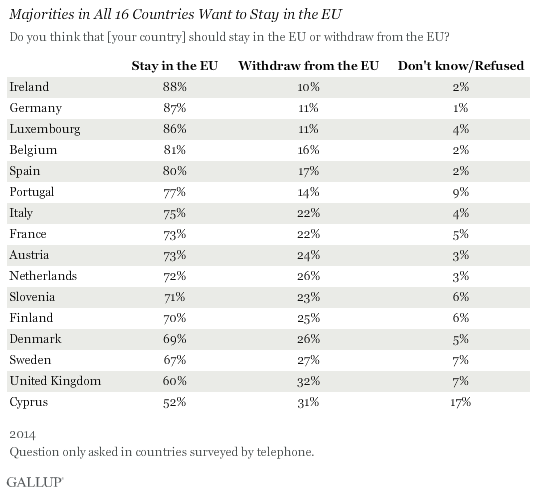Story Highlights
- 49% of EU residents approve and 39% disapprove of EU leadership
- EU recovers lost ground in countries that ended bailout program
- Six in 10 Britons want their country to stay in the EU
BERLIN -- European Union leadership has recouped the job approval ratings it lost when the eurozone slipped into double-dip recession in 2012. In 2014, an average of 49% of EU residents said they approved of the job performance of the leadership of the EU, up substantially from ratings in the low 40s throughout the 18-month recession.

The increase in the EU's leadership approval ratings comes at a crucial time when anti-establishment parties on the right and the left of the political spectrum are gaining more attention across Europe. Not only have anti-EU parties come out on top in several countries in the elections to the European Parliament in May 2014, they have also fared well in recent national or regional elections by criticizing current EU policies.
The EU's approval ratings recovered especially in countries where economic optimism is returning, including the three countries that successfully completed their sovereign bailout programs: Ireland, Spain and Portugal. But when residents began to feel the effects of austerity measures and economic growth first failed to materialize, support for the EU collapsed even in Ireland and Spain. In Ireland and Portugal, EU approval has already rebounded to pre-crisis levels (67% and 45%, respectively), while in Spain approval is still 12 percentage points lower compared with the 59% measured in 2008.
At the same time, the EU's leadership approval remains lowest in the countries that are still dependent on sovereign bailout funds: Greece and Cyprus. In 2014, 23% of Greeks and 28% of Cypriots approved of the job performance of the EU's leadership. However, EU approval continues to be high in key creditor countries such as Germany, Finland and the Netherlands.

In the U.K., where Prime Minister David Cameron has pledged to hold a referendum on EU membership in 2017 if he is re-elected in May this year, a majority of 57% disapproved of the EU's leadership in 2014. Britons' ratings in particular have soured since 2012, when disapproval first reached the majority level.
Benefits of EU Membership Are Less Obvious to Many Europeans
Of the 16 countries where Gallup asked residents whether their EU membership has left their country better or worse off, Ireland is the only one where a majority of residents (58%) said that their country was better off than it was five years ago. The cost-benefit analysis of residents in other bailout countries is more negative. Spaniards were roughly equally divided between those who felt that being part of the EU has left their country better off (37%) and those who stated the opposite (34%). About half of Portuguese and six in 10 Cypriots believed that EU membership has left their countries worse off than they were five years ago.

In the U.K., more than one in three (35%) believed their EU membership has left the country worse off, while 23% said the country is better off and 39% felt things are about the same. This is particularly noteworthy given the rather widespread disapproval of the EU's leadership among Britons.
Still, Most Europeans Want Their Country to Stay in the EU
Despite widespread doubts about the benefits of EU membership in countries such as Portugal or Cyprus, majorities in all 16 countries surveyed want their country to stay in the EU. With the exception of Cyprus and the U.K., at least two-thirds of residents in all countries wanted to continue being part of the EU. In fact, Cypriots were clearly the least likely to say this, but 52% still supported staying in the union. In the U.K., where continued EU membership is clearly an election issue, six in 10 residents thought their country should stay in the EU and a little less than a third would like it to withdraw. In Spain and Portugal, about eight in 10 residents approved of their country's EU membership, while in Ireland almost nine in 10 held this view.

Bottom Line
Even in the U.K., France and Denmark, where right-wing Euroskeptic parties won the elections to the European Parliament in May 2014, clear majorities want their country to stay in the EU. Gallup's data reveal that economic perceptions are an important part of EU attitudes. Europeans who evaluate economic conditions as good or excellent are almost twice as likely to approve of the EU's leadership and considerably more likely to want their country to stay in the EU as those who view conditions as poor. For 2015, the European Commission is forecasting GDP growth of 1.3% for the euro area. This would be its best outcome since 2010 and would likely help to further boost the EU's standing with its residents.
Survey Methods
Results are based on telephone and face-to-face interviews with 1,000 adults, aged 15 and older, conducted in 27 countries in 2014. Fieldwork lasted from June to October 2014, with the majority of countries being surveyed in September and October. For results based on the total sample of national adults, one can say with 95% confidence that the maximum margin of sampling error ranged from a low of ±3.3 percentage points to a high of ±4.0 percentage points in 2014.
For results based on the EU average, the maximum margin of sampling error ranged from a low of ±0.8 percentage points to a high of ±1.2 percentage points for each of the years shown. The 2012 and 2013 averages are based on data from all EU member states. Since Croatia joined the EU on July 1, 2013, its results were first included in the EU average in 2014. In 2010, no data were available for Estonia and Latvia, and in 2014, no data were available for Malta. Because these countries have relatively small populations, their effect on the population-weighted average is negligible, enabling comparison across years.
For more complete methodology and specific survey dates, please review Gallup's Country Data Set details.
Learn more about how the Gallup World Poll works.

